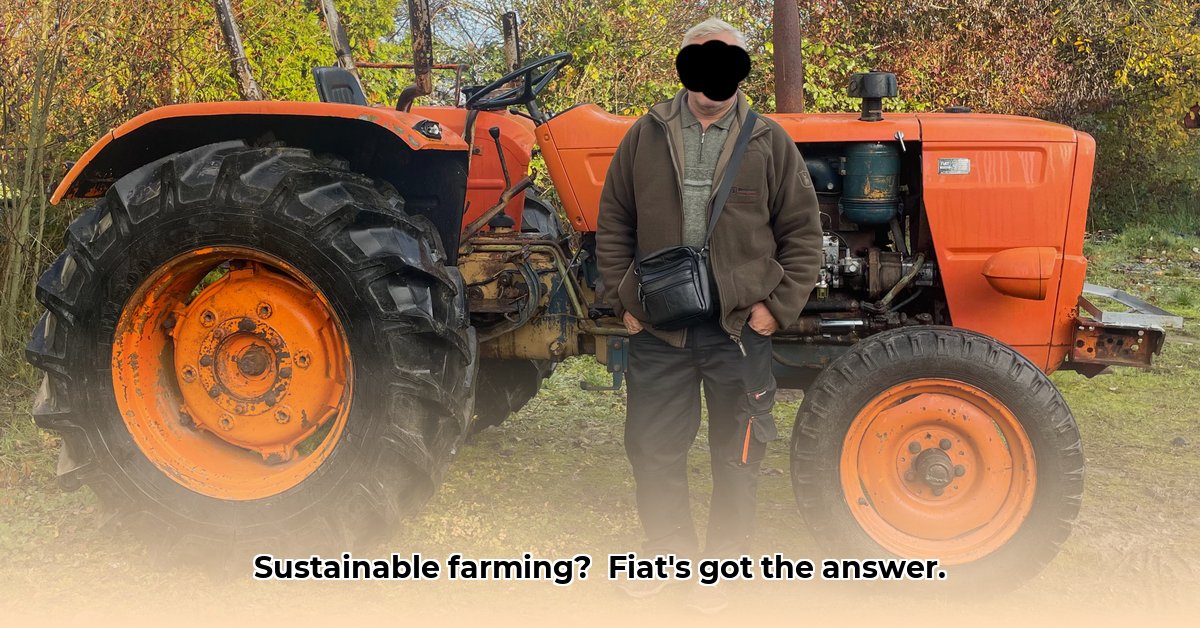
The iconic Fiat tractor. For generations, it’s been a hardworking partner in fields across the country, symbolizing resilience and productivity. But times change. Fiat's exit from the tractor market leaves many farmers facing a critical question: What’s next? For more information on Fiat's history, check out Fiat Tractor History. This guide offers a roadmap for navigating this transition, keeping your farm running smoothly and sustainably. It's a challenge, but with smart planning, you can ensure your farm's continued success.
Assessing Your Current Situation: A Farm Tractor Checkup
Before diving into solutions, let's assess your current situation. Think of it as a comprehensive health check for your Fiat fleet. A meticulous inspection is vital. Begin by carefully examining each tractor. Note the engine's performance, hydraulic system functionality, tire wear, and any potential warning signs. Document everything: detailed notes, photos, even a simple logbook will prove invaluable. This detailed assessment is the foundation for effective short-term and long-term planning. Don't skip this crucial step; it will save you significant time and money later. Have you noticed any significant performance drops lately?
Short-Term Strategies: Keeping Your Fiats Running Strong
Finding parts for older machinery can feel daunting, but effective strategies exist to extend the operational life of your Fiat tractors.
1. Parts Sourcing: A Multi-Pronged Approach
The internet provides access to a wealth of resources. Begin by exploring online marketplaces such as eBay and specialized agricultural parts suppliers. Don't discount salvage yards – surprising finds often await. Networking is crucial. Connect with fellow farmers; you might be surprised by the collective knowledge and access to parts within your farming community. Have you considered contacting online forums dedicated to vintage tractor repair?
2. Preventative Maintenance: Prolonging Tractor Lifespan
Regular maintenance is paramount. Think of it as preventative medicine for your tractor. Adhere to the manufacturer's recommended maintenance schedule meticulously. Regular cleaning, fluid changes, and prompt attention to minor issues prevent costly repairs and maximize your tractor’s lifespan. Is your current maintenance schedule optimized for older equipment?
3. Finding Reliable Mechanics: Partnering with Experts
Locating a mechanic experienced with Fiat tractors requires diligence. Seek recommendations from your farming network, local agricultural groups, and co-ops. Interview potential mechanics to assess their familiarity with Fiat tractors and their capacity to meet your specific needs. Do you have a trusted mechanic you can already rely on?
Long-Term Planning: Building a Sustainable Agricultural Future
Short-term solutions tide you over, but long-term planning ensures sustainability. This section outlines strategies for securing your farm's success beyond the Fiat era.
1. Equipment Replacement: Choosing Your Next Generation of Tractors
The time will come when replacing your Fiats is necessary. This presents an opportunity to enhance sustainability and efficiency. Factors such as fuel efficiency, long-term costs, and suitability for your specific farming practices are paramount. Consider modern, fuel-efficient tractors, exploring alternative fuels like biodiesel or even electric tractors, which are becoming increasingly viable. What are the specific fuel consumption needs of your farm?
2. Financial Planning: Securing Funding for Upgrades
Upgrading equipment is a significant investment. Explore funding options like grants and low-interest loans tailored to agricultural improvements. Leasing can also be a viable solution, offering flexibility and manageable payments. What government programs might provide financial assistance for your upgrades?
3. Sustainability Considerations: Environmentally Conscious Farming
When selecting replacements, prioritize tractors minimizing environmental impact. This includes reduced fuel consumption, lower emissions, and technologies designed to minimize soil compaction. Sustainable farming practices are not just a trend; they're essential for long-term viability and environmental responsibility. Have you assessed the environmental impact of your current farming practices?
Conclusion: Embracing Change, Securing the Future
The retirement of Fiat tractors marks the beginning of a new chapter. By planning proactively, addressing both immediate and long-term needs, you can ensure a smooth transition and a thriving future for your farm. Embrace the change, adapt your strategies, and continue to cultivate success. Are you prepared to implement the strategies outlined in this guide?